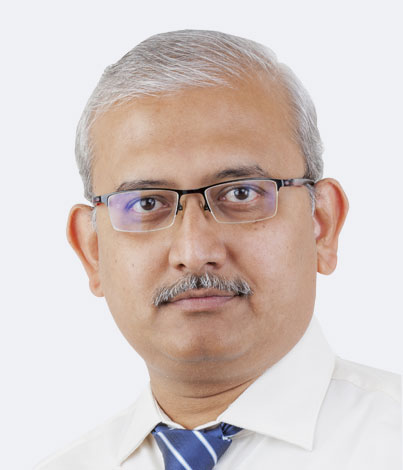Spine Surgery in Pune
Comprehensive Solutions with a Multidisciplinary Approach to Spine Surgery
Your spine is a critical structure that supports your body, enabling movement like walking, twisting, and bending. Composed of vertebrae (bones), disks, joints, soft tissues, nerves, and the spinal cord, the spine relies on strong core muscles for support. Strengthening these muscles through exercise can help prevent back pain and injuries. However, due to modern sedentary lifestyles, spine-related issues have become more common, increasing the need for advanced spine treatment options.
Comprehensive Spine Treatment Options
Each spine condition requires a personalised treatment plan. At Jupiter Hospital, Pune, we offer the best spine surgery treatment in Pune, as well as various non-surgical options, such as:
- Physical therapy, acupuncture, massage therapy, and chiropractic care.
- Medications, including anti-inflammatories and muscle relaxants.
- Injections, such as epidural steroid injections and nerve blocks.
- Spine surgery like discectomy, foraminotomy, and spinal fusion.
With our expertise and patient-centred approach, we are committed to providing the highest standard of care for all spine conditions.
Team
Looking for the Spine Surgeon in Pune
Spine surgery techniques can generally be classified into traditional and minimally invasive approaches. Here’s an overview of both types of spine treatment options we offer:
Traditional Spine Surgery Options
- Laminectomy: Involves removing part of the vertebrae to relieve pressure on the spinal cord.
- Discectomy: A procedure to remove a herniated disc, helping to alleviate nerve compression.
- Spinal Fusion:Joins two or more vertebrae to provide stability and reduce spinal movement.
- Vertebroplasty/Kyphoplasty: Treatments aimed at repairing compression fractures in the spine.
- Spinal Decompression: Techniques designed to reduce pressure on the spinal nerves or spinal cord.
Minimally Invasive Spine Surgery (MISS)
- Endoscopic Discectomy: A procedure using a small camera to remove herniated disc material with minimal impact on surrounding tissues.
- Minimally Invasive Spinal Fusion: Utilises smaller incisions and specialised instruments to fuse vertebrae, resulting in shorter recovery times.
- Microdiscectomy: A less invasive approach to remove herniated disc material with the assistance of a microscope, reducing tissue disruption.
- Ideal Candidates: Endoscopic spine surgery is effective for patients experiencing back pain and leg pain due to conditions like herniated discs and spinal stenosis.
- Smaller Incisions: This approach requires an incision smaller than 1 cm—less than the size of a dime—which is smaller than those used in laser or ultrasonic spinal surgeries.
- Minimally Invasive Approach: The procedure is performed with a camera attached to a slender endoscope, which allows access with minimal impact on surrounding muscles and tissues.
Its benefits include:
- Muscle Preservation
- Faster Recovery
- Quicker Return to Work
- Lower Infection Risk
- Less Pain
- Smaller Incisions (1 cm or less)
We specialise in both traditional and minimally invasive techniques, allowing us to provide the best treatment to our patients. Our dedicated team is committed to delivering effective spine surgery treatment in Pune to help patients achieve improved mobility and pain relief.
If you experience ongoing low back or neck pain, we typically monitor your progress and recommend stable physical activity, over-the-counter treatments, or pain management and anti-inflammatory medication as a first step. Many patients with spine issues can benefit from non-surgical treatments, such as physical therapy, home exercises, medication, or spinal injections, offered at Jupiter Hospital, a spine surgery hospital in Pune.
However, surgery may be the best option for cases where non-surgical options do not bring relief. For instance, if a patient has significant neurogenic pain in the extremities that has not improved with non-surgical approaches, or symptoms such as marked weakness in a limb due to spinal cord or nerve compression, surgical intervention can be the most effective path forward.
We are committed to delivering the best spine surgery treatment in Pune, with our expert spine surgeons helping patients find relief and regain their quality of life with specialised care tailored to their needs.
The primary symptom of spine issues is back or neck pain, with up to 80% of people experiencing back pain at some point. Other signs of spine conditions may include:
- Muscle spasms
- Loss of bowel or bladder control
- Weakness or numbness in the arms and legs
- Paralysis
As a key part of the body, the spine undergoes significant wear and tear, which can lead to various conditions that may require specialised care. At our spine surgery hospital in Pune, we treat a wide range of spine conditions, including:
- Arthritis and related conditions, such as ankylosing spondylitis.
- Back strains and sprains.
- Birth defects like spina bifida.
- Bone spurs and other growths.
- Curvatures of the spine, such as scoliosis and kyphosis.
- Herniated (bulging) disks.
Additional spine-related conditions include:
- Neuromuscular diseases, including amyotrophic lateral sclerosis.
- Nerve injuries, such as spinal stenosis, sciatica, and pinched nerves.
- Osteoporosis, which causes bones to become brittle.
- Spinal cord injuries, including fractures and paralysis.
- Spine tumours and cancers.
- Infections of the spine, such as meningitis and osteomyelitis.
Maintaining a strong and healthy spine is essential for overall well-being. Strengthening your back muscles can provide essential support and reduce the risk of developing spine conditions. Aim to do back-strengthening and stretching exercises at least twice a week. Core exercises like planks can help strengthen the muscles around your abdomen, sides, and back to enhance spine support.
Here are additional tips for protecting your spine:
- Bend your knees and keep your back straight when lifting items.
- Maintain a healthy weight.
- Practise good posture, such as sitting up straight and avoiding slouching.
Consult your healthcare provider if you experience any of the following symptoms:
- Back pain accompanied by fever.
- Loss of bowel or bladder control.
- Leg weakness or pain radiating from your back to your legs.
- Numbness in your arms or legs.
- Pain that worsens, disrupts sleep, or interferes with daily activities.
Patients Speak
Hear the heartwarming stories of patients overcoming difficult afflictions
















 View Map
View Map Book an Appointment
Book an Appointment Find a Doctor
Find a Doctor Health Check-up
Health Check-up












 Find a Doctor
Find a Doctor Health Checkup
Health Checkup Book an Appointment
Book an Appointment